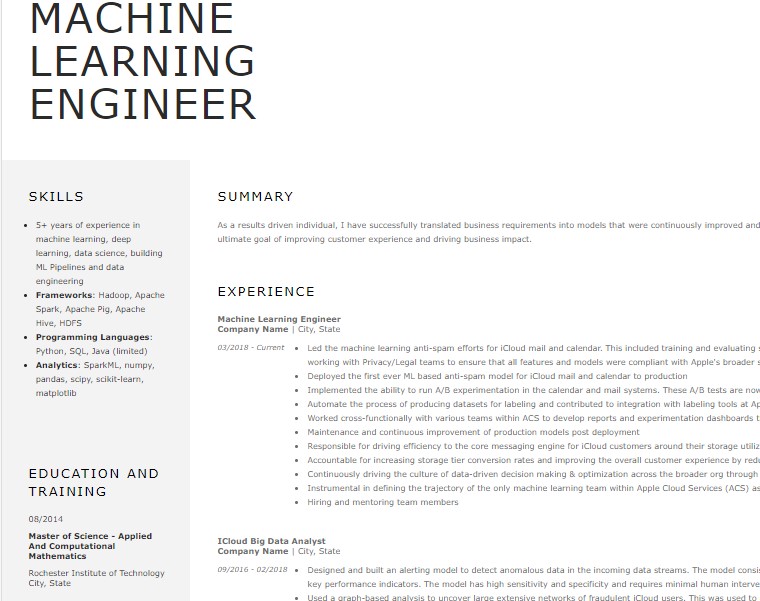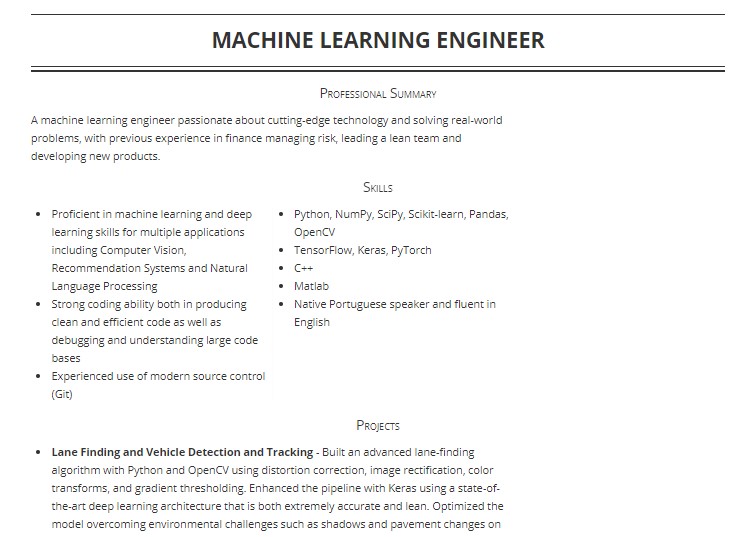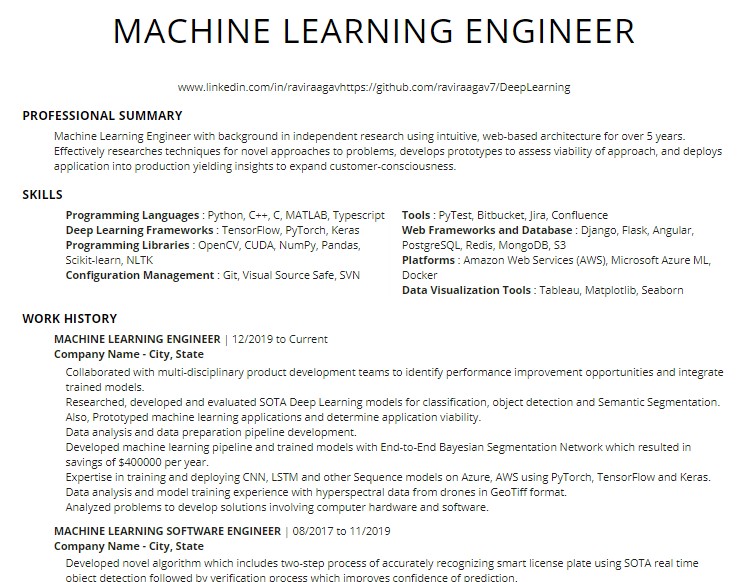The resume is the single most crucial part of an application for any job or project. The resume should be tailored to the potential client or company. It should provide relevant experience, skills, and background in a compelling manner that isn’t overwhelming.
In short, employers demand that you summarize the sum-total of your life in two or three sheets of paper. No problem, right?
If you are getting that familiar chest-clenching feeling, don’t worry, it’s normal. The resume now has an anxiety-inducing mystique about it. But that’s all it is – mystique. This post will go over the basics of tackling your resume to demystify the process.
The Skills Section
The skills section of your resume is a perfect place to show potential employers your abilities to succeed in the role. Employers often pay close attention to the skills you possess to determine if you’re an ideal candidate to consider for the next stage of the hiring process.
In this guide, we highlight the top 10 skills to include in your resume, as well as expert tips on how to best present the skills section of your resume.
Top Skills Employers Want to See
Skills are generally divided into two categories: soft skills and hard skills.
Within IT, be sure to focus your skills section on your hard skills. Also known as technical skills. Technical skills help potential employers skim through your resume and get a quick understanding of your technical abilities.
Top 5 Soft Skills to Include in Your Resume
But not in the skills section
Hard skills are industry-specific. You will know what hard skills are relevant to the employer. Soft skills are transportable and applicable to any job. For example:
- Teamwork
- Communication
- Organization
- Critical thinking
- Flexibility
Although there are tons of soft skills you could be harboring, here is a quick list of the most important soft skills you should capture.
Problem Solving
Regardless of the position you’re applying for, every job has challenges and something will go awry at some point. Your potential employer wants to know if you have the ability to come up with quick and effective solutions amidst chaos.
Communication
Whether it’s verbal or written, being able to communicate effectively with your boss, coworkers, stakeholders, and customers/clients in all situations is extremely valuable. If you’re a great communicator, the better results you will generate.
Teamwork
Most jobs will require you to work with other coworkers at some point, and employers want to be sure that you can succeed in a team environment. Some job positions will prize this skill more than others.
Critical Thinking
Critical thinking is simply your ability to think rationally and thoughtfully in every situation. Employers seek workers who can think through projects or problems and determine the right steps to achieve results.
Organization
Employers want individuals who are good at organizing tasks and projects for coworkers, the management, and for themselves. Having a neatly structured resume is the first step to demonstrating your organizational skills.
These all describe aspects of your personality. Are you the kind of person that can run a project? Can you coordinate a team? Are you the type of person that is reliable and will integrate into their existing structure?
Of course, depending on the position you’re applying for, this list can change to include skills such as creativity, emotional intelligence, attention to detail, responsibility, and much more.
Other soft skill options to consider
Adaptable
Whether you’re a new employee learning the ropes, a long-time employee adjusting to altering corporate goals, or a management using disruptive technologies in the workplace, your career will be disrupted. Companies seek personnel that can swiftly adapt to changing situations and are willing to try new methods and technology.
A keen eye for detail
Businesses pay a high price for mistakes in terms of both time and money. Submit a personalized, proofread resume and cover letter with work history highlights that illustrate thoroughness and conscientiousness to show prospective employers that you are careful and purposeful in all you do.
Collaboration
Your ability to work well with people, both inside and across departments, will be crucial to your professional success. Give instances of effective teamwork and partnerships from your job history — or, if you’re a recent college graduate, examples from your labs, seminars, and coursework —
Creative
Businesses thrive when new ideas and approaches to old challenges are introduced. Hiring managers will pay close attention to someone whose resume abilities demonstrate the ability to think creatively, challenge the current quo, and propose unique ideas.
Customer centric
A company’s success and an employee’s career trajectory are inextricably linked. Employers desire employees that are committed to exceeding the expectations of both internal and external stakeholders.
Empathy
If you want to effectively engage with coworkers, bosses, direct reports, customers, and clients, you need to understand their feelings. The capacity to put yourself in someone else’s shoes, whether for a senior leadership or staff-level function, is a crucial trait.
Employers search for people that can inspire and motivate team members, as well as act with honesty, fairness, and a strategic attitude, even if they aren’t hiring for a managerial position. Wherever possible, emphasize in your resume the professional experience and talents that demonstrate your ability to lead.
Wear multiple hats “Multitasking”
Today’s job is busier and more complicated in many ways than it was in the past. A great resume will show a prospective candidate’s ability to manage multiple projects and objectives.
No, this does not imply being “overly cheery or optimistic.” Rather, demonstrate that you tackle problems with a positive mindset. What gets a work done is resiliency and determination, not a negative outlook. That is something that employers desire.
Problem solver
What work isn’t full of obstacles and challenges? And what employer wants to be on the receiving end of those challenges and problems? On a resume, the ability to settle disagreements and come up with innovative solutions to problems large and little is highly valued.
Self motivated
No supervisor likes to continually stoking the fires of his or her employees. Give examples of how you’ve used initiative to solve difficulties and complete tasks.
Time management
Regardless of the position you pursue, time management is an important skill to have on your CV. Employers want to know that you can tune out distractions, fulfill deadlines, and make the most of your time at work.
Honesty, punctuality, accountability, and dependability are all important aspects of a healthy work ethic. Include examples of those attributes in your career history and resume skills sections.
Top 5 Hard Skills to Include in Your Resume
Hard skills are often geared towards the technical aspect of the job, and each industry or type of job will have its own preferred set. Read through the job description to find out what range of hard skills you’re expected to have and tailor your resume accordingly.
An insider tip is to look directly at the required and preferred sections on the job description and tailer your hard skills around those specific aspects.
It is more difficult to generalize hard skills. However, here are some common hard skills that many industries idealize:
Computer Skills
With advancements in technology, it’s hard to come across a job listing that does not require some level of computer skills. Since the world of computing is quite expansive, be sure to break down your computer skills into 2-3 specific technical proficiencies, such as coding, web development, Microsoft Excel, etc.
Data Analysis
Big Data is a common phenomenon today, and there are several jobs out there that may require you to analyze metrics and make business sense out of it. Data analytics and artificial intelligence are extremely valuable skills to put on your resume.
Negotiation
A lot of jobs, including technical jobs, involve selling products or services, brokering deals, establishing business partnerships, etc. Negotiation skills are key to success in such positions.
Project Management
Some jobs, especially in middle and top management, will require project management skills. Your ability to manage your task flow and accomplish assignments on time is part of project management. And, if you have used any project management software in the past, be sure to include it to showcase your project management experience.
Marketing
Even if you’re not a marketer, any job involving selling and promoting products and services require this hard skill. Having the information about your company’s products and services at your fingertips, and being able to speak or write about them, is a valuable skill that many employers appreciate.
How to Organize the Skills Section on Your Resume
Always put the skills section near the top of your resume. Also, organize the skill section of your resume in bulleted format, and by sorting the skills based on relevance.
For example, if you’re applying for a Java Developer job, you will want to emphasize your skills that are applicable to the Java role. If you worked as a SDET before, that experience might not be the most relevant.
There are several ways you can list your skills on your resume depending on your experience with the job you are seeking:
- Create a separate skill section– This is an option if you have extensive experience in the field you are applying for and want to highlight specific areas or qualifications that will tie in directly to the position
- Weave your skill qualifications into your professional experience section- These two sections may be an ideal area for a prospective employer to learn a lot about you and the skills you have for the position. Make sure you use keywords from the job description when you list both your experience and skills in this section
- Skills can be listed on a functional resume section- This option might work well if you are changing careers and do not have a lot of experience in the area the position is open for
Incorporating Skills into Your Resume
You don’t want a list of skills devoid of context or clarification. The best way to incorporate these skills into your resume is by describing your past work and volunteer experience or academic work.
Highlights Section
Modern resumes are oriented around achievements rather than tasks. The highlights section is your opportunity to highlight three to four significant achievements. If you’ve worn multiple hats, pick the top four achievements relevant to the position, and describe them. For example, write about when you landed a major account or how when you were an HR manager, you oversaw and implemented a new training regimen that reduced sexual harassment allegations.
Demonstrating Skills
The lists above are skills in the abstract. Those skills are expressed by the work you’ve done. For example:
- Planned and executed a fundraising campaign that raised seven-figures over three months.
- Managed company internship program.
- Served as liaison to key stakeholders on behalf of company outreach programs.
These skills demonstrate, by example, several soft skills: (a) communication, (b) organization, (c) emotional intelligence, and (d) teamwork. They also highlight hard skills, such as computer literacy, administrative skills, negotiation, and data analysis.
Organizing Your Skills
If you are high-up in your career, you may want to divide your skills into sections. For example:
- Marketing Growth: these skills highlight the effectiveness of your marketing.
- Innovation: these skills would highlight how you shepherded an innovative product to market.
- Company Reform: this would go over how you solved problems at a company.
Resume Examples
Example Resume 1

Example Resume 2

Example Resume 3

Example Resume 4

Customizing Your Resume
While you will likely operate with a “master” resume that describes the entirety of your work, academic, professional, and volunteer history, you should adjust your “master” resume for each job that you are applying to.
Scrutinize the job listing. What skills are referenced? The important skills are usually referenced several times. Incorporate the target keywords into your resume. Describe your skills the way the company describes what it wants.
Secondly, tailor your resume to be value-oriented, meaning that you should provide information that is more achievement-based than task-based. If you’ve served in multiple roles, begin with the ones you feel proud bout and incorporate them in your Career Highlights Section.
Applying for jobs is stressful. You are judged and assessed for your worth. It’s an unpleasant process. However, there’s no avoiding it. Arm yourself with a persuasive resume to make the process a little less stressful.
What You Should Avoid With Your Resume
Rule #1: Don’t lie about your skills.
I know it’s tempting to exaggerate on your skills on your resume but resist the urge. Never inflate your job title, add a certification, or technical skills you don’t have, or embellish the years of experience you have or tenure at an employer. This will come back to haunt you.
Rule #2: Proofread
Before your resume is sent to recruiters make sure to look for spelling, grammar, and potential formatting issues. Free grammar tools like grammarly could be a big help in fixing grammar errors if writing isn’t your jam.
Rule #3: Don’t misuse words.
Try not to be too wordy. Also do your best to avoid cliché words like “think outside the box”, “synergize”, “thought leader”, or “results-driven”.
Rule #4: Don’t leave out the numbers and percentages
Vagueness helps no one. Your goal in a resume is to quantify your value. All your accomplishments should involve numbers that your can add within your resume. Did you close X% of support tickets faster than the previous year?
As a solution architect did you reach new target markets, increase customer saturation by X%, or increase new sales? Put these types of details in your resume.
For tips on writing a cover letter that will ensure a positive response check out these awesome tips.
Once you get the interview make sure to follow up with the perfect thank you email.
In Conclusion
Ultimately, the way you present your soft skills and hard skills will either qualify you or disqualify you for a job opportunity. Be sure to include your top skills on your resume for the best outcome. And if you’re looking to polish your resume, you can count on our experts at nexus IT group to help you review your resume. Contact us today to begin the conversation with one of our skilled resume writing consultants.